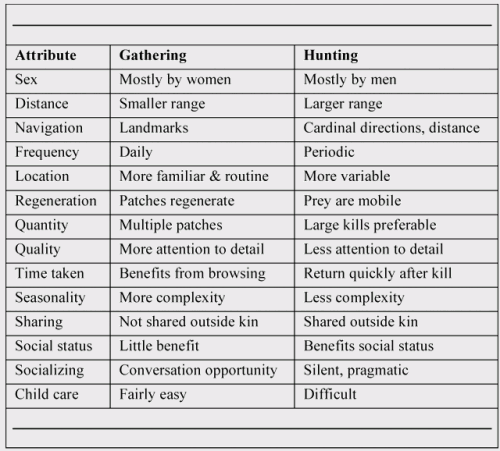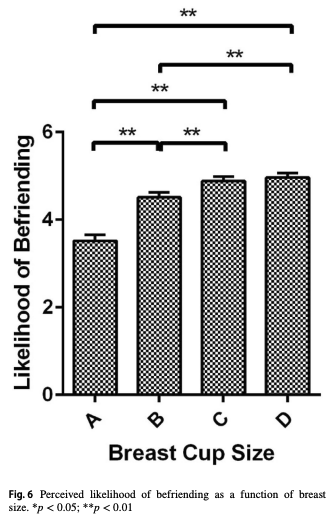It takes a while to assemble a comprehensive rebuttal to pseudoscientific claims — everyone who has dealt seriously with creationists knows that, absurd and ignorant as their arguments are, it takes hard work and diligence to assemble a coherent, evidence-based criticism, something I wish a lot of people who think debating creationists is easy would realize. It’s the same story with that James Damore memo. It’s easy to see that it’s garbage, but much harder to assemble the details of a rebuttal.
Fortunately, the well-research criticisms are steadily emerging now. For instance, Caryl Rivers and Rosalind C. Barnett can declare that “We can say flatly that there is no evidence that women’s biology makes them incapable of performing at the highest levels in any STEM fields”, and back it up with citations.
Many reputable scientific authorities have weighed in on this question, including a major paper in the journal Science debunking the idea that the brains of males and females are so different that they should be educated in single-sex classrooms. The paper was written by eight prominent neuroscientists, headed by professor Diane Halpern of Claremont McKenna College, past president of the American Psychological Association. They argue that “There is no well-designed research showing that single-sex education improves students’ academic performance, but there is evidence that sex segregation increases gender stereotyping and legitimizes institutional sexism.”
They add, “Neuroscientists have found few sex differences in children’s brains beyond the larger volume of boys’ brains and the earlier completion of girls’ brain growth, neither of which is known to relate to learning.”
Several major books have debunked the idea of important brain differences between the sexes. Lise Eliot, associate professor in the Department of Neuroscience at the Chicago Medical School, did an exhaustive review of the scientific literature on human brains from birth to adolescence. She concluded, in her book “Pink Brain, Blue Brain,” that there is “surprisingly little solid evidence of sex differences in children’s brains.”
Rebecca Jordan-Young, a sociomedical scientist and professor at Barnard College, also rejects the notion that there are pink and blue brains, and that the differing organization of female and male brains is the key to behavior. In her book “Brain Storm: The Flaws in the Science of Sex Differences,” she says that this narrative misunderstands the complexities of biology and the dynamic nature of brain development.
And happily, the widely held belief that boys are naturally better than girls at math and science is unraveling among serious scientists. Evidence is mounting that girls are every bit as competent as boys in these areas. Psychology professor Janet Hyde of the University of Wisconsin–Madison has strong U.S. data showing no meaningful differences in math performance among more than seven million boys and girls in grades 2 through 12.
I also like this article by Erin Giglio, a Ph.D. student in evolutionary biology, who discusses the complexity of sexual development and evolution, something avoided by the reductionist generalizations of privileged dabblers like Damore (‘there are only two genders!’ is their rallying cry). But she also makes a significant criticism of the whole evolutionary psychology approach.
Curiously, however, these disciplines do not include evolutionary psychologists: I have never met an evolutionary psychology student taking any course, presenting at any evolutionary biology seminar, or interacting in any way with the evolutionary biology students in my own department, and I have never seen a behavior-focused Ecology, Evolution and Behavior student from my own department mention spending time learning from evolutionary psychologists. This is particularly odd because my university, which is the University of Texas at Austin, happens to host an extremely prominent evolutionary psychologist in the form of Dr. David Buss…and also several prominent and well respected behavioral ecologists in my department, most of whom are specifically prominent in the field of sexual selection and courtship behavior itself. This is also a topic that evolutionary psychologists have a well documented and particularly strong interest in, and this includes Dr. Buss. So why the lack of collaboration?
The answer boils down to the fact that evolutionary biologists and behavioral ecologists — which is, again, the term usually used to describe people studying the evolution of animal behavior in a naturalistic context — are typically some of the most vocal critics of evolutionary psychology. Indeed, several prominent behavioral ecologists have written popular science books that criticize evolutionary psychology openly.
Why might this be the case?
One huge issue is the question of adaptationist hypotheses. Evolutionary biology had a large intradisciplinary discussion back in the late 1970s and early 1980s about adaptationist thinking, largely kicked off by Stephen J. Gould and Richard Lewontin’s classic paper The Spandrels of San Marcos. The central argument of this paper is that evolutionary biologists should not assume that the null expectation for any observable biological trait is that the trait is in some way an adaptation for survival. Indeed, some traits arise as accidents of pleiotropy — genes with multiple effects — and some merely develop over time by chance. Gould and Lewontin argued that in order to describe a trait as a known evolutionary adaptation, evolutionary biologists first needed to identify some evidence that the trait was both adaptive to survival and also that it had sufficient heritability for selection to be capable of acting on it.
While this paper was controversial at the time it was published, it has largely become accepted among evolutionary biologists that it is generally correct. In fact, I have most often seen evolutionary biologists use the term ‘adaptationist thinking’ amongst themselves as a slur, implying that another scientist’s research paradigm is insufficiently critically rigorous; it’s a term right up there with ‘telling Just-So stories’ within the field. It doesn’t mean that you can’t hypothesize that a trait evolved because of positive selection — it just means that adaptationist hypotheses must be tested against a null, neutral hypothesis.
By contrast, evolutionary psychologists openly argue that adaptationist assumptions are essential to the field and are simply good science, and that starting with adaptationist hypotheses just makes sense. This is further confounded by the methodology generally chosen in the field of evolutionary psychology (see below), which is typically limited to surveys confirming that the behavior in question does in fact exist — something even acknowledged by defenders of the field’s capabilities of falsification. Occasionally fMRI studies are also used.
Yeah, I’ve seen this behavior myself — Evo psych people react to the name Gould like you’ve just summoned Satan. While guilty of some hyperbolic overreach, Gould’s views have largely been accepted: you can’t simply say a trait exists, and therefore it has an adaptive purpose. That completely undermines the Evo Psych ‘research program’.
If you’re one of those people who read Damore’s memo and thought it sounded reasonable, brace yourself. You’re like the buffoon who read about Flood geology and thought that sounded like a good alternative hypothesis, who is about to get crushed by the deluge of real scholars of geology and paleontology and biology who will be pointing out how stupid the argument is. The people who actually understand the fields Damore was abusing are rising up now.
Don’t panic too much, though. Just as the creationists keep churning out excuses and exercises in motivated reasoning to defend their nonsense, you’ll still have ranks of evolutionary psychologists shoveling crap to keep you happy.








